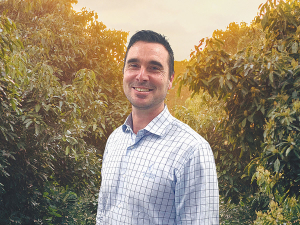Farmer confidence dips slightly, but positivity still dominates
Farmer confidence has taken a slight dip according to the final Rabobank rural confidence survey for the year.
 NZ Avocado chief executive Brad Siebert says growers are facing increasing cost pressure including orchard inputs, labour and interest rates.
NZ Avocado chief executive Brad Siebert says growers are facing increasing cost pressure including orchard inputs, labour and interest rates.
New Zealand Avocado chief executive Brad Siebert says avocado growers are facing increasing cost pressure across all areas of their business.
Siebert says these include orchard inputs, labour and interest rates.
His comments come after the release of the Rabobank Global Avocado Update 2024, which saw a 35% year-on-year decline in production for the 2023/24 crop.
RaboResearch analyst Pia Piggott says Cyclone Gabrielle impacted avocado quality, meaning that in 2023, exports were “well back” on the prior year, with total volume exports declining 51% year-on-year.
“While, in the domestic market, an oversupply of lower-grade fruit caused retail prices to fall,” Piggott says.
Despite this, she still says there were some bright spots.
“Exports to China in 2023 grew by 159% yearon- year (YOY), and this is a really positive sign as we see efforts to build market share in Asia as an essential step if New Zealand wants to become a more significant global player in term of avocado exports,” Piggott says.
Meanwhile, Siebert says current favourable growing conditions provide a positive outlook for orchard productivity in the upcoming season, alongside new and expanding market opportunities.
“While some sense of rationalisation will be seen as growers look deeper into their own on orchard costs towards maximising profitability, the industry continues to see year on year increases in fruit volumes from more recent plantings,” he told Hort News.
Siebert says that over the past few years, adverse weather events have impacted crop volumes and quality, however, summer 2023/24 has provided favourable growing conditions.
“The industry crop estimates point to an increase in production and in quality outcomes leading to an optimistic view in opportunities across domestic and export markets,” he adds.
He says the adverse effects of Cyclone Gabrielle forced the industry to review many aspects of how it operates and to reinforce best practise.
“This led to discussions on how the industry can be better equipped to navigate these seasonal challenges whether they be driven from environmental or global supply & demand impacts. The past season has proven how vulnerable the crop can be to adverse weather events, specifically wind, with fruit being downgraded away from export towards the domestic market in the 2023-24 season,” Siebert says.
“Reducing the compliance burden and arbitrary restrictions across the entire supply chain is now firmly in focus so that opportunities to find value can be capitalised on whatever mother nature throws our way.”
A 40th Anniversary event to remember.
The Mountain Warrior Shane Cameron is coming back to his roots as key note speaker at the East Coast Farming Expo Property Brokers Evening Muster in February.
OPINION: The euphoria over the Government’s two new bills to replace the broken Resource Management Act is over.
While the recent storms in the upper and eastern part of the North Island have hit a few kiwifruit growers, it is unlikely to have a major impact on the overall industry.
Keratin biomaterials company Keraplast and Wools of New Zealand have signed a new superpremium wool contract which is said to deliver a boost to wool growers.
While things are looking positive for the red meat sector in 2026, volatility in global trade remains a concern, says the Meat Industry Association (MIA).